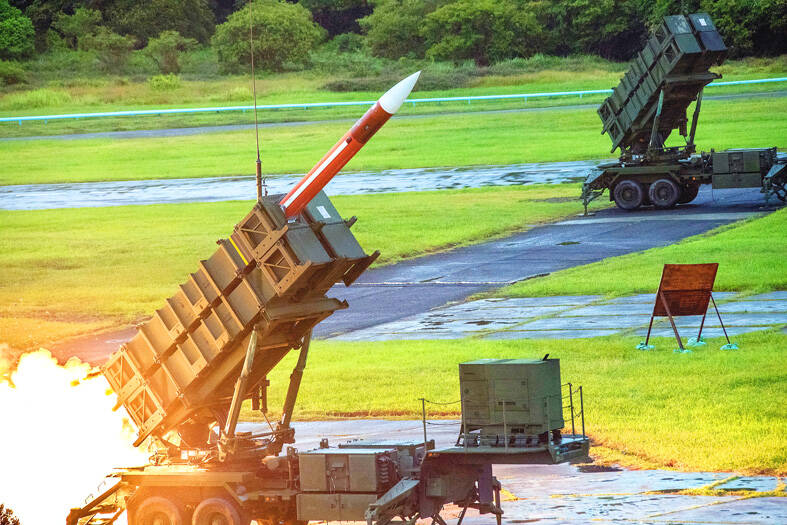Taiwan should maintain its existing conventional forces to combat low-intensity conflicts while acquiring more asymmetric warfare capabilities to counter potential aggression from China, said a report by military analyst Eric Gomez published by the Cato Institute on Friday last week.
The report compared military items sold to Taiwan during US president-elect Donald Trump’s first term in office and US President Joe Biden’s current term.
Trump sold more traditional weapons while Biden emphasized improving asymmetric warfare capabilities, the report said.

Photo courtesy of Ministry of National Defense via CNA
The first Trump administration sold Taiwan US$10.4 billion (NT$319.9 million) in traditional weapons, while the Biden administration has only sold US$500 million worth of traditional weapons, the report said.
“Traditional weapons are more flexible, but they tend to have much higher unit and lifetime costs and take longer to build than asymmetric capabilities,” the report said.
As of last month, only one of four military sales packages made by the Trump administration has been delivered to Taiwan, it said.
Initial deliveries of M1 Abrams tanks and F-16 jets should begin in the next few months and be completed within two years, it added.
The Biden administration focused more on asymmetric capabilities, with nine sales packages worth a total of US$4.36 billion, and maintenance, with 14 sales packages worth a total of US$2.81 billion, the report said.
Acquiring more asymmetric capabilities while maintaining existing traditional capabilities is a “sensible strategy,” he said.
“While the first Trump administration sold Taiwan more weapons, the Biden administration sold Taiwan a better mix of weapons for Taiwan’s self-defense needs,” Gomez said.
A recent report by the Financial Times said that Taiwan might put forward a large arms sales wish list worth US$15 billion for surface warships, F-35 fighter jets, E-2D early warning aircraft and Patriot interceptors, he said.
Except for the Patriot interceptors, “this would be a terrible choice for Taiwan,” Gomez said.
Not only would these traditional systems consume most of Taiwan’s limited defense budget, but “they would be relatively easy for China to counter and take a long time to be built and delivered,” he said.
Taiwan has correctly started focusing more on the development of much-needed asymmetric warfare capabilities in the last few years, he said.
While large-scale arms sales might seem appealing, it is more rational for the shared interests of both nations for Taiwan to buy cheaper, but more militarily effective asymmetric capabilities, he added.

Taiwan is stepping up plans to create self-sufficient supply chains for combat drones and increase foreign orders from the US to counter China’s numerical superiority, a defense official said on Saturday. Commenting on condition of anonymity, the official said the nation’s armed forces are in agreement with US Admiral Samuel Paparo’s assessment that Taiwan’s military must be prepared to turn the nation’s waters into a “hellscape” for the Chinese People’s Liberation Army (PLA). Paparo, the commander of the US Indo-Pacific Command, reiterated the concept during a Congressional hearing in Washington on Wednesday. He first coined the term in a security conference last

Prosecutors today declined to say who was questioned regarding alleged forgery on petitions to recall Democratic Progressive Party (DPP) legislators, after Chinese-language media earlier reported that members of the Chinese Nationalist Party (KMT) Youth League were brought in for questioning. The Ministry of Justice Investigation Bureau confirmed that two people had been questioned, but did not disclose any further information about the ongoing investigation. KMT Youth League members Lee Hsiao-liang (李孝亮) and Liu Szu-yin (劉思吟) — who are leading the effort to recall DPP caucus chief executive Rosalia Wu (吳思瑤) and Legislator Wu Pei-yi (吳沛憶) — both posted on Facebook saying: “I

Sung Chien-liang (宋建樑), who led efforts to recall Democratic Progressive Party (DPP) Legislator Lee Kun-cheng (李坤城), was released on bail of NT$80,000 today amid outcry over his decision to wear a Nazi armband to questioning the night before. Sung arrived at the New Taipei District Prosecutors’ Office for questioning in a recall petition forgery case last night wearing a red armband bearing a swastika, carrying a copy of Adolf Hitler’s Mein Kampf and giving a Nazi salute. Sung left the building at 1:15am without the armband and covering the book with his coat. Lee said today that this is a serious

The Ministry of Economic Affairs has fined Taobao NT$1.2 million (US$36,912) for advertisements that exceed its approved business scope, requiring the Chinese e-commerce platform to make corrections in the first half of this year or its license may be revoked. Lawmakers have called for stricter enforcement of Chinese e-commerce platforms and measures to prevent China from laundering its goods through Taiwan in response to US President Donald Trump’s heavy tariffs on China. The Legislative Yuan’s Finance Committee met today to discuss policies to prevent China from dumping goods in Taiwan, inviting government agencies to report. Democratic Progressive Party Legislator Kuo Kuo-wen (郭國文) said